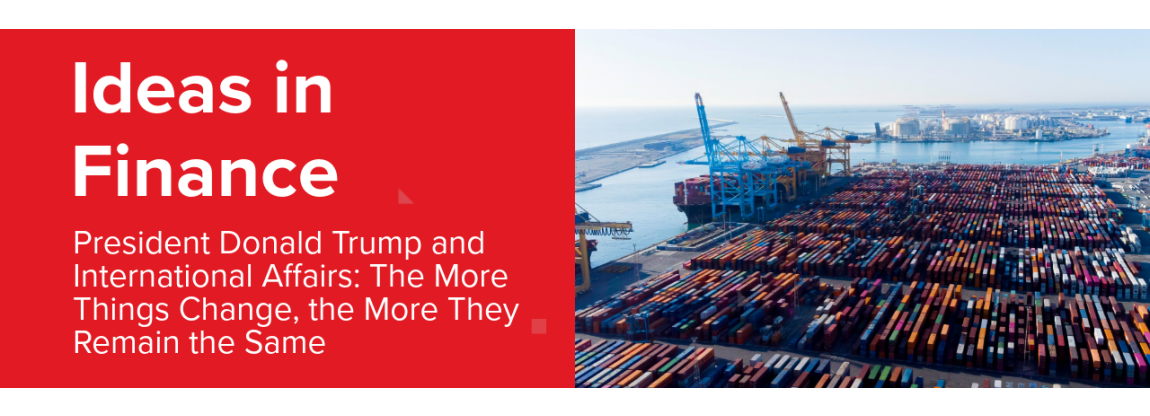President Donald Trump and International Affairs: The More Things Change, the More They Remain the Same
I was recently reading an article in the magazine Foreign Affairs. Here is a particularly interesting passage that stood out to me:
No, this is not from the latest issue. This from an article published in the January 1972 issue Foreign Affairs, written by C. Fred Bergsten. The President in question is not Donald Trump but Richard Nixon. While the bit about dollar-convertibility might have tipped off some readers, the rest of it could have been written yesterday. The point, of course, is that one can usually gain a sense of perspective by historical inquiry. Apart from frustrations that one might feel about the human failure to learn from mistakes or simply resolve problems once and for all rather than having to circle back to them, one can take some comfort in knowing that, usually, we have been through the same thing before. More than once. While this is not the place for such an accounting of the past, a little digging will more often than not reveal that the major disagreements, disputes, and debates we experience today are merely replays. Sometimes, the same ground was trodden centuries ago.
The 1972 article by Bergsten expresses a concern that America might retreat from the world, into an isolationist pre-1914 position. The same worry has been expressed this year by various commentators. It’s possible, of course. If it happens in the 2020s, the Americans could hardly be accused on plunging into the matter rashly, since it’s obviously been on the cards for decades. What was most interesting about the Bergsten article is his advice to the administration regarding a better way to address the problems that President Nixon was trying to solve. The problems then, as now, are real. The American worker, for instance, has a genuine grievance over closed factories, some now long gone and never coming back. Trade deficits are problematic, and the national debt is arguably beyond crisis levels. With the fiscal situation in poor shape, international commitments, especially in Europe, might not be sustainable. Dealing with these issues now, most of which have only become exacerbated with the passage of time, is not easy. Tough action is necessary. But Bergsten thought that it would be best to approach the problems carefully, and not as aggressively as Nixon.
There are reflections of Nixon’s style in Donald Trump’s but, importantly, there are glimmers of Bergsten’s pleas in President Trump’s approach, which has a deal-making side to it (as is to be expected) that was somewhat absent from Nixon’s, at least at first. In short, Bergsten urged Nixon to be more diplomatic, more open to negotiation and compromise. A negotiation process should recognise that there are fractures in the international economic order that will only widen if not addressed and that it is therefore in everyone’s interest to work to resolve them. Bergsten (1972, p.211) says, “The United States must thus clarify what it wants in return and present its proposals to others, and the foreign response must be adequate.”
The problems that President Nixon was seeking to solve were never really solved (obviously). They just sort of became forgotten, best ignored, deemed less important relative to other things. There is a tendency to leave matters unresolved, loose ends untidied, cans kicked down the road. That is why, regardless of how new something appears to be, whether tariffs or demands that the other NATO countries pay a ‘fair share’, we need only spend a little time researching the past to find that there is nothing new under the sun. That is simultaneously comforting and annoying. The trillion-dollar question is whether the wounds that so damaged the international order in the 1970s, a mere 25 years after that order was first established, have been left to fester too long.
Discussion Question
Read the article, The New Economics and U.S. Foreign Policy, by C. Fred Bergsten, published in Foreign Affairs (January 1972, Vol. 50, No. 2). How closely does 2025 resemble 1971-1972? Is there scope for a negotiated revision to the international economic order or have the problems been left to grow too long? How do the BRICS nations’ plans fit into this story?
Read more Ideas in Finance
Young Investors Seeking Dividends
The Velocity of Money and Central Bank Digital Currencies
Should You Want Interest Rates to Fall?
What’s Going on with the Chinese Economy?
Is it Negative Gearing or Monetised Housing?
Set the Interest Rate at Zero. Why Not?
The Commodity Research Bureau (CRB) Index and Australian Inflation
The Disagreement between Elon Musk and Donald Trump: The Simplest Explanation?

